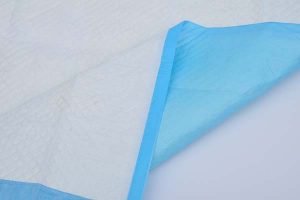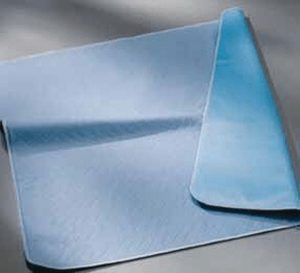Absorbent Underpads are a useful product for a multitude of purposes. While the biggest difference between disposable and cloth absorbent underpads is rather obvious (one produces far less waste and thus is better for the environment), there are other factors (such as cost-effectiveness and method of absorption) that may influence your decision regarding which type is the better buy for you.
All absorbent underpads are constructed with three layers (the soft outer layer in contact with the skin, an absorbent middle, and a water-resistant backing to prevent leakage onto the surfaces you’re trying to protect). With that being said, there are many different brands to choose from, and likewise, they are all different in the materials that are used in their production.
For example, there are three common types of material used to create the backing: Vinyl, Urethane, and Sunburned. Their characteristics are as follows:
- Vinyl barriers are more cost-effective and require a longer drying period. It is not breathable (and can actually cause your body to heat during sleep).
- Urethane barriers allow for heat transfer, dry much quicker, and tend to last longer overall.
- Sunburned barriers are 100% polypropylene (thus are also better for the environment because polypropylene is a 100% recyclable material).
Furthermore, some brands even feature an antibacterial and anti-fungal finish.
Water Absorption
 The level of absorption is not determined by the size of the underpad but rather by the quantity of absorbent material contained within, and the density of the material used. The most common types of absorbency filler are:
The level of absorption is not determined by the size of the underpad but rather by the quantity of absorbent material contained within, and the density of the material used. The most common types of absorbency filler are:
- Cotton – which is able to absorb 27 times its weight.
- Rayon – which can retain 80% of absorbed moisture.
- Nylon – which is absorbent up to 12%.
- Polymer – which has the capacity to absorb between 30% and 60% of its weight.
There are also differences in how they do their job. Disposable underpads work by drawing moisture away from the body and into the middle absorbent layer, thereby protecting the skin from bedsores and other possible issues such as infections. Cloth underpads serve the same purpose but work by drawing the moisture into the center, and then away into the sides in order to protect the user’s skin.
In addition, just like there is a multitude of brands available, so too are there countless designs and styles to choose from, depending on your needs and aesthetic tastes. Furthermore, underpad uses are not confined to beds and wheelchairs, as more and more people are discovering other benefits to their existence. For example, they can be used on baby diaper-changing tables, the bottom of pet cages (and for puppy toilet-training), in cars, children’s beds, etc..
Advantages and Disadvantages
 There are, of course, pros and cons to each type of absorbent underpad. Here we will list a few for each cloth and disposable.
There are, of course, pros and cons to each type of absorbent underpad. Here we will list a few for each cloth and disposable.
Cloth – Pros:
- They’re reusable, so they are better for the environment.
- The last 100 uses each (the equivalent of 200 disposable pads!).
- Financially they cost overall of 50% less than their disposable counterparts.
- They tend to stay in place better than disposable pads.
Cons:
- The user must be naked (at least from the waist down) in order for them to work effectively.
- They are quite heavy when wet.
- They can take a long time to dry completely.
Disposable – Pros:
- They’re great for traveling because you can just toss them once they’ve been used.
- They can be used for a couple of nights in a row (as long as it’s still clean and dry).
- They offer better odor control because they stop the growth of yeast and bacteria.
Cons:
- Due to their lightweight, they tend to move around which results in folding (this can be quite annoying in addition to essentially rendering it useless when that does happen).
- They take up storage space.
- They cost more money overall due to the frequency of trips to buy more (factoring in gas to get there with the cost of the pads themselves).
Incontinence is a fairly common issue faced by millions of people every day, and it’s nothing to be ashamed of. With all of the different kinds and styles of protective underpads available nowadays, you can be certain you’ll find the right size, style, and type to suit your needs and the needs of your loved one(s). Wake up dry so you can just focus on the things that really matter. KOSA Medical can help you solve these.